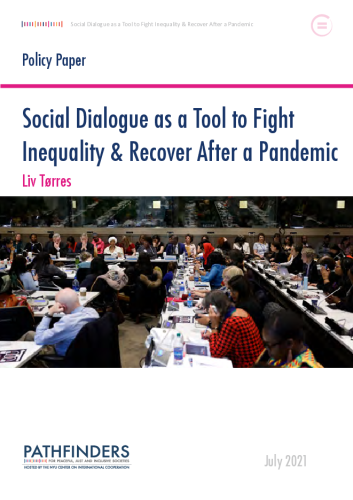Si vis pacem, cole justitiam” – “If you desire peace, cultivate justice,” is the motto enshrined in the foundations of the International Labour Organization’s (ILO) building in Geneva, established in 1919. World War I, the Russian Revolution, and the fear of communism that followed, had convinced world leaders that, “universal and lasting peace can be established only if it is based upon social justice,” as they stated in the 1919 Versailles Treaty. Widespread injustice, inequalities, and exclusion were the enemies of peace. Many would argue they are no less relevant today.

CSW63 – Side Event – The Road to 2020. Photo credit: Flickr user UN Women. (CC BY-NC 2.0)
Over the past 100 years, “social compacts” and “social dialogue” are frequently referenced all over the world as tools to achieve shared growth and prosperity, better working conditions, higher living standards, and higher productivity. Social dialogue is often seen as a miraculous recipe for sustainable development, decent work, and growth, especially in times of crisis or recovery. This was seen in South Africa, where institutions were established as part of the effort to rebuild after Apartheid. It has also occurred periodically in Latin America when social issues have become contentious. The concept was evoked in the U.S.’ New Deal of the 1930s following the economic “crash,” as well as in crisis-torn Scandinavia in the same decade. Now, social dialogue has emerged again among those who are now planning priorities for next decade in the face of massive challenges amidst the COVID-19 pandemic.
Liv Tørres considers the following questions in this paper: what actually is social dialogue and what value may it hold for post-pandemic management and recovery?
